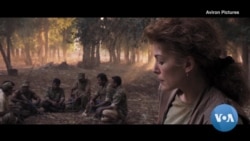American reporter Marie Colvin told important stories about the suffering of civilians in war.
Starting in the late 1980s, Colvin traveled to some of the most dangerous and horrifying conflicts in the world. She reported on the people she met and their experiences: parents whose children were killed or missing, children silenced by trauma, victims of rape and other atrocities.
Right now, several media projects explore Colvin’s life.
Matthew Heineman's movie A Private War is based on a story published in Vanity Fair magazine following the reporter’s death in Syria in 2012.
Actor Rosamund Pike plays the fierce American reporter who gave her life while reporting on conflicts around the world.
"In war zones, parents go to bed at night not knowing if their children will see the morning. That is a measure of fear that I can never feel."
While her fear may not have been as deep, the movie shows that Colvin clearly suffered as a result of her work. She lost her eye in 2001 when Sri Lankan forces attacked in a rebel-held area. The black-cloth eye cover she wore became a sign of her bravery.
But the movie suggests Marie Colvin’s mental pain was far worse. She most surely was a victim of PTSD, post-traumatic stress disorder. Pike, playing Colvin, tells a friend about her relationship to alcohol.
"I'm most happy with a vodka martini in my hand, but I can't stand the fact that the chatter in my head won't go quiet until there's a quart of vodka inside me.”
That is a main message expressed in A Private War. The mind continues to battle long after the person has left the war zone.
Colvin had terrible hallucinations for years. Often she would see the bloodied body of a young girl lying on Colvin’s own bed.
Rosamund Pike said understanding how Colvin moved was important in portraying her.
"I had to learn to smoke convincingly, because for Marie, everything was better with a cigarette, every conversation, every car drive. I had to see the way she gestured with her hands -- she had these wide apart fingers. I had to work out how the eye patch made her angle her head differently."
As a producer of documentaries, Heineman wanted to give this film a real-life feeling. In a scene of the discovery of a mass burial place in Iraq, Heineman used victims of war to play mourners.
"And at the end of that scene, like in any documentary that I made, something unforeseen happened. They started chanting and doing this prayer for the dead."
Rosamund Pike says she had a similar experience while filming an unwritten scene with a refugee woman. It is set in a safe house in 2012, during a Syrian government operation that was part of the three year offensive against the city of Homs.
The woman tells how she feeds her baby only sugar and water. She says her body stopped producing milk after the suffering of losing one of her children to a bomb attack.
"The woman said to me, she said, 'Please, I don't want this just to be words on paper. I want the world to know that a generation is dying here. I want the world to know my story.'"
Pike says, at that time, she felt what drove Colvin: the reporter’s responsibility to serve as a witness to people's suffering.
Filmmaker Heineman looks at the complexity of Colvin’s personality, her bravery and drive to get war reports out. He shows how she stood her ground in Homs even during the heavy shelling of the city by Syrian forces.
"She felt compelled to tell the story, to tell the story of a group of 28,000 civilians in Homs who were besieged...and she felt, as she often did, ‘If I don't do this, then who will?’"
And that story, of the inhumanity she witnessed in Homs was her last. Marie Colvin was killed there in a government shelling attack in 2012.
“Maybe I would have liked a more normal life. Maybe I just don’t know how.”
I’m Caty Weaver.
__________________________________________________________
Words in This Story
trauma - n. a very difficult or unpleasant experience that causes someone to have mental or emotional problems usually for a long time
atrocity - n. a very cruel or terrible act or action
chatter - n. noisy talking and other sounds
gesture - n. a movement of your body (especially of your hands and arms) that shows or emphasizes an idea or a feeling
unforeseen - adj. not predicted or expected
scene - n. a part of a play, movie, story, etc., in which a particular action or activity occurs
besiege - v. to surround a city, building, etc., with soldiers and try to take control of it





